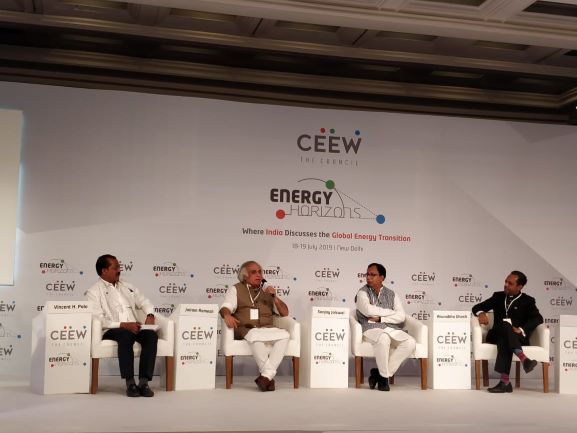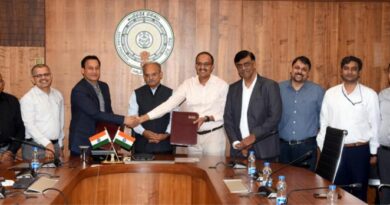Energy Horizons: Lawmakers, Environment and Poll Issues
 Vincent H. Pala, Jairam Ramesh and Sanjay Jaiswal interact in the session moderated by Arunabha Ghosh of CEEW.
Vincent H. Pala, Jairam Ramesh and Sanjay Jaiswal interact in the session moderated by Arunabha Ghosh of CEEW.
The session on “Making the energy transition a poll topic” at the Energy Horizons event in Delhi saw lawmakers discuss energy transition and poll issues.
The speakers were:
Dr. Sanjay Jaiswal, Member of Parliament
Vincent H. Pala, Member of Parliament
Jairam Ramesh, Member of Parliament
Arunabha Ghosh, CEEW (Moderator)
Low carbon rural development
Dr. Jaiswal began the session by lauding the LPG scheme and ‘electricity for all‘ and identified it as the reason behind the poll success. On clean energy, he talked about government’s ambition to install bio gasifiers in every house to tackle GHGs, generate clean energy and at the same time save precious forex.
Arunabha Ghosh then asked Vincent Pala about energy transition to which he informed that how Clean Energy is concentrated in North India but he quickly added that his constituency in the state of Meghalaya “has 53000 MW capacity potential of RE” but the demand for energy is not that high.
So enhancement of grid to transport the “extra energy to other parts of the country” is a feasible option that he wants to work for. He then talked about the change in the attitude of the people of his constituency towards RE and added that “people are slowly adopting RE” and this could be a sign of energy transition. Ghosh then pointed out that the jobs created in the renewable industry have been encouraging. According to the report, 99890 workers are employed in Indian RE sector which has witnessed a five-fold growth since 2014 (19,790 people).
Electricity for all
Jairam Ramesh spoke on the energy needs of India and the challenges which includes “50 million homes need access to electricity which is still not available”. He said micro-challenges to electrify those houses are many and they “still exist”.
He pointed out that Energy projection for the country a few years back didn’t figure “environment” as one of the issues which has the government, then and now, struggling to find a solution for energy demand and climate change. He quickly added that “coal will be there as we will add 400 million people who will need energy”.
He further said that much to our disappointment “cleaner coal’ will provide base load capacity or nuclear energy will have to scaled up to pick the load. He expressed remorse that India and Indians will “have to make that ‘cruel choice’ of having coal in the energy mix”.
Climate Change
Ghosh brought up the issue of livelihood and life from global heating and climate change and asked Sanjay Jaiswal whether his constituency is facing problems from climate change. Jaiswal said that climate change as an issue started to crop up in west when the crude oil prices started to peaked in the early 2000s. Though he later added that the erratic behavior of the climate that led to a 10-year drought that has been affecting the northern fertile belt for a decade.
Ironically the arid areas are facing the floods while the wet regions are water-scarce, Jaiswal said. Ghosh then asked Pala about the Himalayan ecosystem facing climate change and its vulnerability. Pala answered that the effect of climate change impact is harsher than what they had expected. despite many water sources in Shillong, piped water is used for carrying drinking water.
Solar Energy Vs Coal
While commenting on Renewable Energy, he cited the case of Australian households where a majority have solar panels and the extra energy is now sold to the utilities. “Such kind of innovation is needed” he added for energy transition so that the “people are encouraged to adopt best resources” of energy generation. Ghosh questioned Ramesh about the economic case of RE and clean energy.
Ramesh lauded the leapfrog that the PM took for solar energy targets but added that besides technological leapfrogging there is a need for political leapfrogging. Especially in states whose large part of revenues came from Coal, therefore in the states that are dependent on coal like Bihar, Jharkhand, AP, Telangana, technology leapfrogging is one part of the solution another part is institutional and regulatory leapfrogging or change. He then cited Germany as a successful case which changed its entire grid to incorporate the RE.
Ghosh said that political economies impact all the pillars of the clean energy transition. And then he asked how legislators react to this and what can be done differently. Jaiswal pointed that we in India only think of 5 years as long as the govt in power. Even for EVs, the targets are for only 5 years. he made an uncomfortable remark that the country is “more populist than working governments”. To explain his point he used and expressed his disappointment over Andhra Pradesh case and added that the “new govt failed to follow the previous government agreements”. He then shrugged his shoulders and said that central and state governments have ‘different agendas’. He expressed his optimism that despite the “unpopular” face the current government in power is facing they are trying to solve the issues. Arunabha at this point added that CEEW is working with Discoms on a “new business line” so that they can become “cash positive”.
He then directed another firing question and asked whether their constituency is ready to pay for better and reliable electricity. Pala to this said that the theft of electricity is a major issue in his constituency and said that only 50% of household in Shillong pay for energy. He did add that the people in his constituency are ready to pay for better energy supply. Jairam Ramesh said it is a “no brainer” that bulk of people are ready to pay more for a better supply. Jaiswal also joined in that people are ready to pay more for a better supply of electricity. To this Ramesh jokingly quipped that “people are ready to pay but politicians are not ready”.
Growth, sustainability and jobs in Energy Transition
On job creation, all the panelists agreed that there is scope for growth and job creation in a sustainable manner in the industry. Pala added that Indians are going to Africa to fix solar installations that means that people are ready to provide better service which would lead to more jobs and more money in RE.
Ramesh took a jibe saying that the country’s target for 8% growth is ecologically unsustainable but the “public discourse” is such which believes that the country can have 8% growth and also stay sustainable. To this Jaiswal quickly added that he is one of the optimists, “I am optimistic that both are possible” and disruptive technologies and its development will be able to make this happen. He added that Fossil fuels no longer add any jobs but RE has the potential to create jobs. He added that in 5 years time the government will come up with a plan to make that happen.
Population and health
Jaiswal says most of the problems in the country are stemming from population as India does not have strict regulations to control this demographic phenomenon. He added that until and unless it is controlled development remains futile.
Ramesh pointed out that many states reaching a demographic shift. On Health, he said today 8% of all death in the country are environment-related. Pala here made a point that people should know that in a couple of years people will have to pay for health like they do in Germany.
Our View
Though the session marked the end of the event, much was left unsaid by the politicians. The dilution of a serious issue such as climate change and global heating give us a peek that may be the Indian media, as well as authorities, have not yet started to treat this as a threat that climate change actually is. The discussion had no mention of flash floods, air pollution or toxicity levels of water, air or land or farmers suicides due to drought or floods. As Jaiswal rightly pointed out, we are a populist government which too can be blinded by populist agendas rather than focussing on the reality that has been staring at us due to decades of neglect.





The Weekly Sustainablity Digest is very informative and useful .